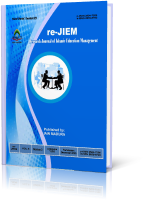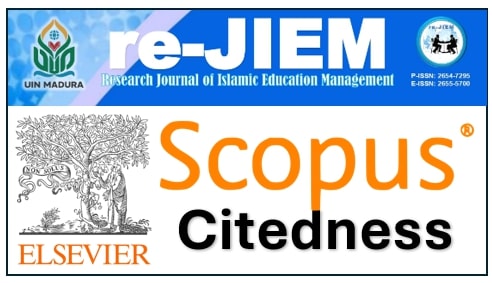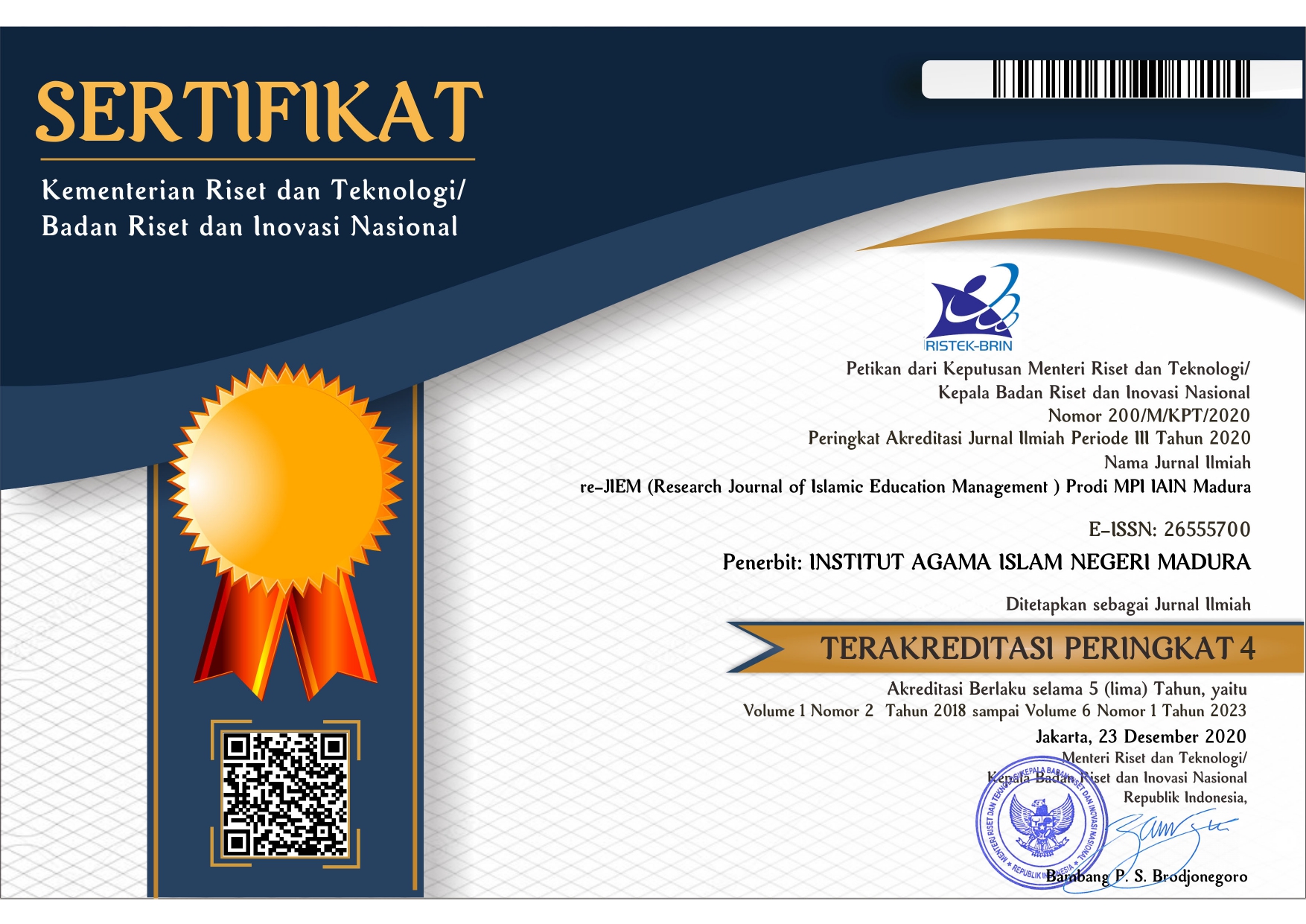KONSEPTUALISASI FUNGSI-FUNGSI MANAJEMEN PENDIDIKAN PROFETIK DALAM AL QUR’AN; KAJIAN AYAT-AYAT KISAH NABI SULAIMAN AS
 Abstract views: 668
,
Abstract views: 668
,
 PDF downloads: 970
PDF downloads: 970
Abstract
This research aims to conceptualize the functions of prophetic educational management as contained in the Qur'an, particularly through the study of verses that narrate the story of Prophet Solomon (AS). Utilizing the content analysis research method, this study identifies and elaborates on the educational management principles applied by Prophet Solomon (AS), which include planning, organizing, implementing, and monitoring functions. In terms of planning, Prophet Solomon (AS) is known for his ability to formulate clear strategies and goals. Organizing is evident from his ability to structure his government and distribute tasks effectively. The implementation function is reflected in his ability to make decisions and implement policies wisely. Meanwhile, monitoring is conducted through strict control and evaluation mechanisms to ensure that tasks are executed according to plan. The findings indicate that the story of Prophet Solomon (AS) in the Qur'an provides practical and philosophical guidance relevant to the development of modern educational management. This study is expected to contribute theoretically to the field of Islamic education and offer a new perspective for education practitioners in implementing prophetic values in their educational management.
Downloads
References
Arief, Z. Manajemen Profetik Dalam Rekrutmen Sdm Dakwah. Spektra: Jurnal Ilmu-Ilmu Sosial; Vol 5 No 1 (2023): Spektra : Jurnal Ilmu-Ilmu Sosial.
Gulick, Luther. Dictionary of Education. New York: McGraw-Hill Book Company, t.tp, 1973. Handoko. Manajemen Personalia dan Sumber Daya Manusia. Yogyakarta: BPFE, 1996.
Hadi, Sutrisno. Metodologi Research. Yogyakarta: Yasbit Fakultas Psikologi Universitas Gajah Mada.
Hamka, Tafsir Al-Azhar, Jakarta, Gema Insani, 2015.
Hamka, ‘Tafsir Al Azhar’, Jilid 7
Hawariy(al), Sayyid Mahmud. Al-Idarah Al-Ushul Wa Usul Ilmiah. Kairo : cetakan ketiga, tt.
Jauhari, Irfan, and Binti Maunah, ‘Kategori Kepemimpinan Transformasional Dalam Aspek Spiritualisasi Pendidikan Islam (Studi Kasus Di MTs Negeri 1 Ponorogo)’, Tarbawi Ngabar: Jurnal of Education, 3.2 (2022), 192–205
Manshur „Abdul Hakim, Sulaiman. The world’s Greatest Kingdom History, diterjemahkan oleh Umi Nurun Ni’mah dari judul asli Sulaiman ‘Alaihis Al-Salam Al-Nabiyyu Al-Maliku. Bandung, Mizania, 2016.
Maraghi(al). Ahmad Mustafa. Tafsir al-Maraghi juz 19. Mesir: Mustafa l-Bab al-Halabi. 1365 H/1946 M.
Mattawang, Salehuddin. Wawasan Kepemimpinan Nabi Sulaiman As Dalam Al-Qur’an (Suatu Kajian Tafsir Tematik). Makassar : Fakultas Ushuluddin Dan Filsafat Uin Alauddin, 2013.
Mushodiq, Muhamad Agus. Representamen Cinta Dalam Kisah Nabi Sulaiman Dan Ratu Saba ’ Surat An-Naml (Studi Analisis Semiotika Dan Komunikasi Interpersonal). Al-Tsaqafa: Jurnal Peradaban Islam Vol. 15, no. 2 (2018).
Mutohar, Prim Masrokan. Diktat Kuliah Manajemen Pendidikan. Tulungagung : STAIN, 2005.
Shihab, M. Quraish. Tafsir Al-Mishbah, pesan, kesan dan keserasian al-qur’an. Jakarta, Lentera hati, 2005
Siregar, Edison. Pengantar Manajemen & Bisnis. Bandung: Widina Bhakti Persada, 2021.
Tanzeh, Ahmad, Manajemen Komunikasi Profetik Dan Peningkatan Kinerja Guru, 2023
Utami, Neni, Muhammad Yoga Aditia dan Binti Nur Asiyah. Penerapan Manajemen POAC (Planning, Organizing, Actuating Dan Controlling) Pada Usaha Dawet Semar Di Kabupaten Blitar. Jurnal Penelitian Ekonomi Manajemen dan Bisnis (JEKOMBIS), Vol.2, No.2 (2023)
Copyright (c) 2024 Abdul Razak, Ahmad Tanzeh

This work is licensed under a Creative Commons Attribution-ShareAlike 4.0 International License.
Authors who publish with this journal agree to the following terms:
Authors retain copyright and grant the journal the right of first publication with the work simultaneously licensed under a Creative Commons Attribution-ShareAlike 4.0 International License that allows others to copy and redistribute the material in any medium or format with an acknowledgment of the work's authorship and initial publication in this journal and also allows them to remix, transform, and build upon the material for any purpose, even commercially, with contributions under the same license as the original.
Authors are able to enter into separate, additional contractual arrangements for the non-exclusive distribution of the journal's published version of the work (e.g., post it to an institutional repository or publish it in a book), with an acknowledgment of its initial publication in this journal.
Authors are permitted and encouraged to post their work online (e.g., in institutional repositories or on their website) prior to and during the submission process, as it can lead to productive exchanges, as well as earlier and greater citation of published work.


























